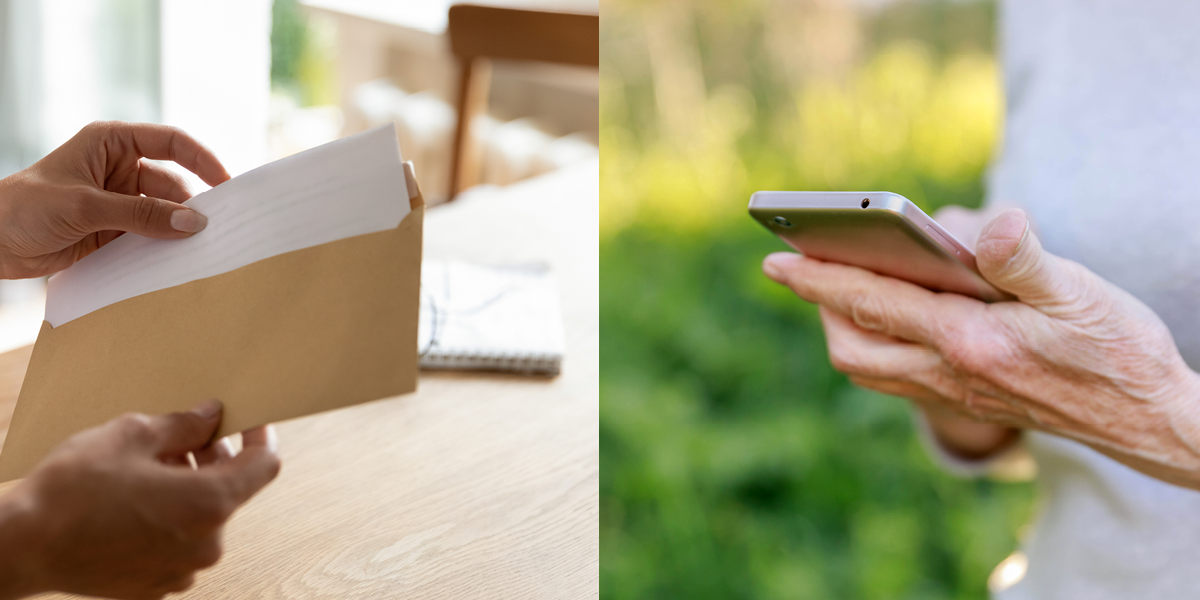At United Midwest Savings Bank, keeping your personal information secure is our priority. Each year scam artists and identity thieves steal billions of dollars from unsuspecting consumers. We’ve taken proactive steps to ensure your security online, on our mobile app and within our offices by using secure technology. Scams are constantly changing so we continually work to find ways to protect you, but there are also ways you can protect yourself by knowing what to look out for.
How you can protect yourself:
Steps to minimize your risk of fraud and theft.

Check fraud and phone scams are on the rise
With so much attention on different types of fraud found online today, many might believe that check fraud (mail) and phone scams are a thing of the past. That's exactly what scammers are counting on.
Protect Yourself Against Check Fraud
- To mail a check, use a secure mail drop such as inside a post office versus an unsecured public-facing mailbox.
- Don’t let incoming or outgoing mail sit in your mailbox.
- Sign up for Informed Delivery and get daily emails that preview your mail and packages scheduled to arrive soon.
- Review your bank statements monthly and compare the checks written by you to your statement showing checks that have cleared.
- Report altered or fraudulent checks to your bank within 60 days of statement date so that you can dispute the fraud.
- To avoid paper checks and mailing checks, sign up for online banking and pay your bills online.
Don't Become a Victim of Check Fraud
- Don’t accept a check from someone you don’t know or have never met in person.
- Don’t send or wire money to strangers. (Individuals or businesses).
- Don’t cash a check you’re not expecting.
- Have your bank verify the check before depositing it.
- Ask your bank to place a hold on the check you plan to deposit to ensure it clears and is good before you spend any of the funds.
What is the "Grandparent Scam?"
One of the latest phone scams is referred to as “The Grandparent Scam.” Beware if you receive an urgent phone call from someone claiming to be a family member. In this particular scam, the caller pretends to be a grandchild in trouble—an accident, in the hospital, in jail or possibly in a foreign country. The caller seems to provide just enough detail and the voice so familiar that the entire situation is very convincing.
Sometimes the caller will try to make the situation even more realistic by providing the “grandparent” with a number to call a “reliable” third party number they provide to “explain everything.” They say this number is for a person of authority such as a police officer, attorney, or doctor. The key element of the scam is the caller then asks for money to be sent or wired and “don’t tell Mom or Dad.”
Tips to prevent phone scams
While the "Grandparent Scam" has been around for years, its prevalence is on the rise again. Here are a few tips:
- Victims of this scam can be chosen randomly or carefully selected. Sometimes the scammers buy lists with very specific information. They might also pour through social media sites for information or hack into email accounts. Be careful what you post and use extra caution with your email—such as using multi-factor authorization to log in.
- If you receive one of these phone calls, the first thing to do is not panic! Try to ask very specific questions that only a family member would know. Get off the phone to call your grandchild or other family members with the number(s) you already have for them to verify the situation. DO NOT call any number the scammer may give to you. The minute money is requested, this should be a red flag about the situation.
If you think you might be a victim of fraud, a phone scam or ID theft
To learn more on how to recover from identity theft and fraud, visit the FTC’s Identity Theft Consumer Information page: https://consumer.ftc.gov/features/identity-theft
If you are the victim of a scam, contact local law enforcement and report it to the FTC website ftc.gov/complaint or by calling 1-877-FTC-HELP. For more information about fraud and scams, AARP provides helpful tips and advice at https://www.aarp.org/money/scams-fraud/.